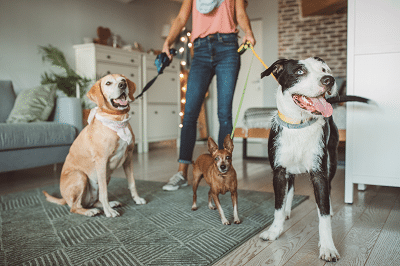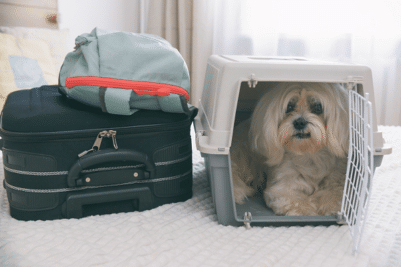Summertime brings a plethora of fun and outdoor activities that your dog can enjoy with you. Here are ten tips for keeping your pet safe and comfortable this summer, wherever your adventures may take you:
- Never leave your dog in a hot car. The most common cause of heatstroke for dogs is being left in a car with inadequate ventilation on a warm day. In a hot car with poor air flow, a dog’s body temperature can rise rapidly and quickly become hazardous to their health. Dogs should never be left unattended in a car during the summer months, even with the windows down. Parked cars can quickly reach deadly temperatures, even in the shade and with windows open. It only takes a few moments for a dog’s body temperature to rise dramatically and put their safety at risk.
- Make sure your dog has access to drinking water and shade. Other common causes of heat stroke and dehydration are when dogs are left outside on hot days without any shade or access to water. Always make sure your dog has some shade to escape to from the sun outside, and always supply lots of fresh, cool drinking water for them. Remember to bring bottles of water on walks and outings as well.
- Be aware of hot asphalt and other surfaces. Don’t walk your dog during the hottest part of the day— usually between 11am and 4pm. Instead, opt for cooler times like early morning and evening when the sun is not directly overhead. Be wary of how hot asphalt and other hard surfaces can be for a dog’s paws, and try to choose routes like gravel, woodchip paths, or even dirt roads for your daily walks to protect your dog’s paws.
- Don’t assume your dog can swim. Not all dogs like the water or are natural swimmers. If it’s your dog’s first summer near water, take it slow and don’t force or throw them into the water.
- Get your dog a lifejacket. Even if your dog can swim, make sure you have life jackets for them if you’re going boating, canoeing, or doing any other water activities that would require a human to have a lifejacket.
- Slather on the sunscreen. Skin cancer is the most common form of cancer in dogs, and dogs can get sunburned too! Apply a specially-formulated pet sunscreen to delicate, exposed areas like bellies and noses if you’re going to be spending some time outside or if you’re pet loves to sunbathe.
- Keep them restrained. In new outdoor environments, such as a camping site, or at the cottage, your dog might have the urge to chase after wild animals. Keep them on a leash or lead if there might be any risk of these encounters. It can be dangerous if they get too close to a road, or if they choose to tangle with the wrong wild animal.
- Make sure your dog is protected from ticks, fleas, and mosquitos. Again, camp sites, hiking trails and other outdoor areas all carry a possibility of harboring ticks and fleas. Make sure you pet is up to date on their preventative medications, and if you are going to be in mosquito or fly-infested areas, look into getting an insect repellant made especially for dogs to keep them bug-free. Any formulas containing DEET should never be used on animals.
- Fire Safety. Summer brings fire-related activities such as BBQ’s and campfires. Keep your dog on a leash and away open flames. Do not let them try to retrieve sticks from a fire or grab food off a BBQ.
- Watch what treats your dog gets. Some things, like watermelon make great summertime treats for your dog, but others like chocolate ice cream can be toxic for dogs. Be aware of what foods can be dangerous for your dog and make sure to avoid them.
LifeLearn News
Note: This article, written by LifeLearn Animal Health (LifeLearn Inc.) is licensed to this practice for the personal use of our clients. Any copying, printing or further distribution is prohibited without the express written permission of Lifelearn. Please note that the news information presented here is NOT a substitute for a proper consultation and/or clinical examination of your pet by a veterinarian.










